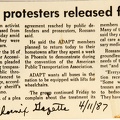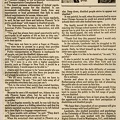Logo of a sun. The Arizona Republic
April 13, 1987, Phoenix, Arizona
[This story continues in ADAPT 314 but the entire text is included here for easier reading.]
PHOTO by David Petkiewicz/Republic: A large group of people are standing, heading into the Hyatt Regency Hotel. Among those standing some people in wheelchairs are visible, and a reporter is there with a camera.
Caption reads: Wheelchair-bound protesters and their supporters gather at the Hyatt Regency in downtown Phoenix. The group converged on the American Public Transit Association's convention at the hotel last week.
Title: Driven by anger, disabled man has fought long, hard for access.
By CHUCK HAWLEY
The Arizona Republic
Mike Landwehr pushes his own wheelchair, but it's really anger that drives the wheels.
"Every day, my anger is brought forward again when l have to push my wheelchair 10 blocks in my own hometown,“ said Landwehr, a Chicago man who has been arrested a dozen or more times since 1978 while demonstrating for access to public transportation for the disabled. “I'm running out of patience.”
Landwehr spent much of last week in Phoenix as a spokesman for American Disabled for Accessible Public Transit.
The Denver-based group has a reputation of “getting in the face" of public officials by creating ruckuses at meetings of the American Public Transit Association, a group Landwehr describes as "the enemy."
Surrounding hotels, restaurants and buses where transportation officials meet, ADAPT members express demands in rhythmic chants:
“What do we want?
"Access!
“When do we want it?
"Now!"
It is, the group says, a civil-rights demonstration.
Howard Adams is not driven by anger, although he was paralyzed from the neck down in a swimming accident 20 years ago.
Adams, a Phoenix councilman, said disability is something he lives with, but he doesn't thrive on it.
"I‘m not an expert on it,“ Adams said, “it's not the most important thing in my life."
He disagrees with the civil-disobedience tactics used by ADAPT.
"I guess I pour my anger into other things," he said. Adams, who served in the Arizona Legislature before his election to the City Council, recently was appointed by President Reagan to the 22-member Architectural and Transportation Compliance Board.
The board oversees enforcement of federal regulations governing access for the disabled. It can recommend withholding federal funds from any organization or local government that fails to meet federal requirements for access, Adams said.
Although Adams does not use city buses regularly, he said, he has used them and believes Phoenix "is in pretty good shape" with respect to disabled people.
The demonstrators, he says, have a beef with the American Public Transportation Association, not with Phoenix.
"The goal has always been equal opportunity and to participate in all aspects of life as best as they can," Adams said. "I agree with their goals, but I don't agree with their tactics.
"They were not here to point a finger at Phoenix. They were here to protest to a group that provides public transportation to people around the country."
Public transportation in Phoenix is inadequate for all people, not just the disabled, Adams said.
"If I wanted to go to the council chambers right now, (8:30 p.m.) I couldn't get there on the bus anyway," he said. "If I were in a city with a higher population density, such as Chicago or New York, it would be a different story. I would expect to be able to."
Adams said there appear to be "some people who are professionally disabled just like there are people who will always be soldiers in World War II."
"We all carry burdens with us, but we have to overcome them," he said. "You can't take away all of the problems everybody has; you just can't.
"But, to the extent that society has created barriers, you have to remove them, and I think we are doing it here."
Because he uses a lift-equipped van, Adams does not ride Phoenix buses often, but he said he is not unfamiliar with the difficulty of getting from one city to another.
In Los Angeles recently, he said, he was told that he could board a plane in a folding wheelchair and that his battery-operated machine would have to be left behind for a later flight in a baggage compartment.
"I have trouble with airlines," he said. "They don't care. They just want to get you out of there."
When his motorized chair arrived in Phoenix on a later plane, he said, "there was $2,000 in damage to it."
Landwehr, 43, was born with spinal bifida, a severe birth defect that now often is correctable. New surgical techniques came too late for him, however. He lost the use of his legs during surgery when he was 12 years old.
Landwehr remembers that he once tried to deny his disability, shun his wheelchair and be like everyone else.
"I would get myself seated in a restaurant and ask the waitress to take my chair away and fold it up in a corner," he said. "It was a way of being like everyone else. Deep down, disabled people strive to appear not disabled.”
It was painful, he said, when his parents had to move from Chicago because he could not attend public high schools there with able-bodied teen-agers.
The family moved 60 miles to the suburbs after rejecting the Chicago school system's offer to provide a special bus to pick him up and deliver him to a school for the handicapped, the only school he said school officials would allow him to attend.
"Thank God they (his parents) knew I would only learn to live in an institution," he said.
In the suburbs, Landwehr said, he struggled to lift himself into a school bus unequipped for handicapped people. Daily, he lifted himself up the school steps as other teen-agers watched.
"I know what it is like to be stared at," he said. "It's painful."
It also is painful, he said, that Chicago, the nation's third-most-populous city, after New York and Los Angeles, has no city buses with wheelchair lifts for the disabled.
Landwehr said that the daily difficulty of overcoming obstacles just to gain access to places others take for granted has hardened his stance for total access.
He is militant.
Arrests and abuse do not appear to faze him. Embarrassing others and taking the risk of alienating the public also do not seem to faze him.
"There is nobody more alienated than people living in little rooms in institutions," Landwehr said. "We want to expose the public to the full range of people who are disabled.
"I think our presence here at least gives the public the opportunity to reflect upon their perceptions of disabilities and disabled people.
"We hope that a byproduct of our presence will give us some leverage with local politicians."
Landwehr, who studied journalism and psychology at the University of Illinois but didn't earn a degree, is unemployed. He once worked with the Disability Rights Defense Fund in Washington, D.C., until federal funding for the group was cut.
"We fooled them, though," he said. "Twenty-two of us started collecting Social Security disability checks and just kept on working, doing what we had been doing until the money ran out."
Public officials sometimes complain that the cost of total access for the disabled is too great and the need too small. Landwehr says he doesn't believe it.
For example, Milwaukee once touted the purchase of lift-equipped buses but operated them randomly on unannounced routes.
Photos above: head shots of Howard Adams in white shirt and tie, and Mike Landwher with flannel shirt and mustache.
Caption reads: Howard Adams (left) and Mike Landwehr both are disabled, but Adams disagrees with the civil-disobedience tactics used by Landwehr's group.
- Created on
- Thursday 11 July 2013
- Posted on
- Monday 18 September 2017
- Tags
- Access Board, ADAPT - American Disabled for Accessible Public Transit, airlines breaking wheelchairs, Anger, APTA - American Public Transit Association, APTA convention, arrest, ATBCB - Architectural and Transportation Barriers Compliance Board, chants, civil rights, cost, DREDF - Disability Rights Education and Defense Fund, Hyatt Regency Hotel, Mike Landwehr, professionally disabled, school bus access, special schools, Vice Mayor Adams, wheelchair bound
- Albums
- Visits
- 1324
- Rating score
- no rate
- Rate this photo


0 comments